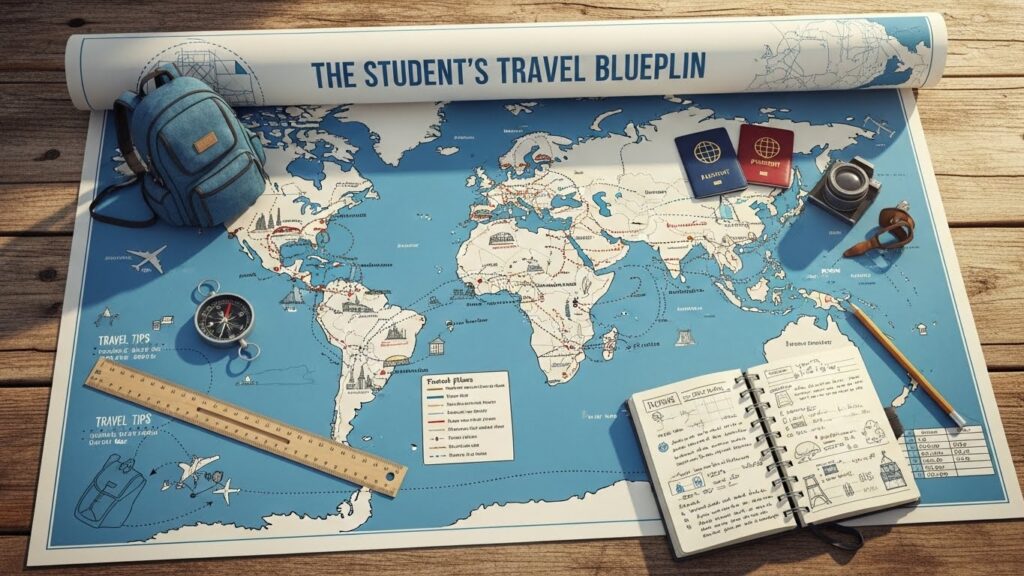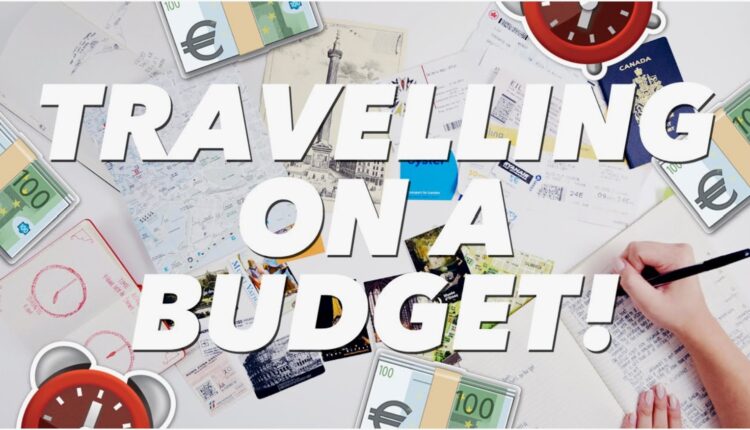How to Travel Every Weekend on a Student Budget
How to Travel Every Weekend on a Student Budget. See more, spend less, and make every weekend a story worth telling.
“The Trip Everyone’s Talking About (And You Haven’t Taken Yet)”
Your phone lights up — another weekend, another photo dump.
There’s Ana posing in front of the Eiffel Tower, Mateo kayaking through the fjords, and Sara tagging you under “Wish you were here!” You smile, double-tap, and tell yourself: Maybe next weekend.
But then next weekend turns into never.
You scroll again, wondering how everyone else seems to be living the dream while you’re counting coins at the campus café. If that sounds familiar, you’re not alone. According to the QS Global Student Survey (2024), 64% of international students say they can’t afford to travel during their study abroad program. Yet the same survey found that students who travel at least twice a month report 38% higher satisfaction and cultural immersion than those who stay local (IES Abroad, 2023).
That gap — between wanting to explore and feeling unable to — defines one of the biggest emotional contradictions of studying abroad. You’re in a foreign country, surrounded by beauty, culture, and history, yet you might feel stuck inside your budget bubble.
But here’s the empowering truth:
You don’t need a big budget to live big experiences. You just need a different approach — one that trades luxury for creativity, and expensive itineraries for spontaneous adventures.
The Emotional Side of “Travel FOMO”
Psychologists studying international student experiences have identified a growing phenomenon known as “study abroad FOMO.” It’s the pressure to keep up with others’ adventures — the fear that if you don’t travel as much, you’re missing out on what everyone else will remember.
A 2023 report by the International Student Wellbeing Institute (ISWI) found that 57% of students feel anxiety or inadequacy when seeing peers’ travel posts online. Ironically, that sense of missing out can discourage the very thing that helps mental health most: exploring.
Here’s the perspective shift: travel isn’t about checking destinations off a map — it’s about collecting experiences that expand your worldview. Even a train ride to a nearby town can teach you more about local culture than a long-haul flight to a famous capital.
Reframing What “Adventure” Means
When you start to think of travel as something you create, not something you buy, you open endless possibilities. That might mean:
- Taking a spontaneous day trip with classmates to a nearby village.
- Joining a local festival instead of booking a weekend abroad.
- Exploring hidden parts of your host city that tourists never find.
The point isn’t to spend more — it’s to see differently.
According to The Student Traveller Index (2024), the happiest students abroad aren’t those with the biggest budgets, but those with the most curiosity. They approach every weekend like an opportunity to connect, learn, and breathe outside the classroom.
Your Turning Point
Imagine this weekend being the one that changes your routine. Instead of watching someone else’s story, you start writing your own — not in distant cities, but one local journey at a time. Whether it’s a $10 bus ride or a shared hostel room, every trip can become a story you’ll tell for years.
So before the next photo dump hits your feed, make a decision:
Don’t let another weekend scroll past — make it your own adventure, no matter your budget.
“The Real Cost of Seeing the World”

Let’s talk money — not the dream version, but the real one.
Every international student knows the monthly budget struggle: tuition, rent, food, transport, textbooks, maybe a gym pass if you’re lucky — and somewhere in there, you’re supposed to fit travel. It sounds impossible, right? But when you look closer at the numbers, the math isn’t as scary as it seems.
Where Does the Student Budget Really Go?
According to StudyPortals (2024), the average international student spends between $900 and $1,500 per month on living expenses, depending on the city and country. The breakdown looks something like this:
- Rent: $400–$800
- Food: $150–$250
- Transport: $60–$100
- Miscellaneous (social life, subscriptions, etc.): $150–$200
- Travel fund: usually $0–$50
At first glance, that last line looks hopeless — but here’s the twist. Students who plan intentionally for micro-travel (short weekend trips) report saving up to $600 per semester, simply by optimizing what they already spend.
How? They swap rideshare apps for regional trains, cook more meals at home, or share accommodation with friends during trips. Each small adjustment adds up to what one student in Madrid called “my freedom fund” — the savings that make exploring possible.
The Rise of the $20 Weekend
Budget travel technology has completely reshaped how students explore. Gone are the days when you needed $200 for a weekend trip.
- FlixBus offers intercity routes in Europe for as little as $9–$25.
- BlaBlaCar allows students to share car rides, cutting transport costs by up to 60%.
- Omio and Trainline let you compare train and bus fares instantly.
- Ryanair and Wizz Air often release $10–$30 flash fares, especially for early Friday or late Sunday flights — perfect for weekend travel.
A survey by Youth Travel Confederation (2023) found that 72% of young travelers under 25 use at least one of these apps monthly, and half say they can afford more frequent trips because of them.
What’s more, a typical weekend getaway (Friday night to Sunday) costs students between $20 and $60 — including transport and shared lodging — if booked early and done smartly.
That’s less than a week’s worth of takeout coffee or a couple of nights out.
Top Budget-Friendly Student Destinations

If you’re studying in Europe or a major international hub, you might be just a few hours away from multiple adventure options. Here are some examples from the Global Student Mobility Index (2024):
- From Paris: Bruges (Belgium), Strasbourg, or Lyon for under $40.
- From Berlin: Prague, Dresden, or Poznań under $30 by bus.
- From Madrid: Porto or Valencia for $25 flights.
- From Singapore: Johor Bahru (Malaysia) or Bali for under $50 if planned early.
Even within one country, students can explore culturally distinct regions for the cost of a movie ticket. The trick is not distance — it’s discovery.
The Psychology of Spending: Why “I Can’t Afford It” Is Often a Myth
Economists at the Center for Student Economics (CSE, 2023) found that the average student underestimates how much they can save for leisure travel by 30–40%, mainly due to small impulse expenses.
That could be:
- A few daily coffees ($25/week).
- Food delivery ($30–$50/week).
- Subscriptions or unused memberships ($15–$25/month).
Reallocating even $10–15 per week can fund 1–2 weekend trips each month. It’s not about earning more — it’s about spending differently.
One psychology-based saving strategy that works well is “Goal Substitution.” Instead of saying “I need to stop buying coffee,” students reframe it as “This $10 is my train ticket to Venice.” By linking small sacrifices to tangible rewards, travel becomes emotionally achievable, not financially abstract.
Takeaway
You don’t need to save for months to see the world — you just need a system that turns every free weekend into an adventure. Once you see your budget as flexible, not fixed, every Saturday becomes an opportunity waiting to be explored.
“Rework your budget tonight — and you might be boarding your first $20 trip this Friday.”
“Micro-Adventures, Maximum Memories”
When you picture “travel,” what comes to mind? Maybe long-haul flights, five-day itineraries, and a backpack stuffed for border-hopping. But for most international students, that version of travel is a fantasy.
The truth is, the most life-changing journeys rarely happen over long breaks — they happen on ordinary weekends, with a single backpack and a $25 bus ticket. Welcome to the world of micro-adventures: short, affordable getaways that recharge your mind, deepen your friendships, and reshape how you see your host country.
The Science Behind Small Adventures
Researchers call it the “micro-adventure effect.”
According to The Student Traveller Index (2024), students who take frequent short trips (1–3 days) report:
- 58% stronger social connections with peers and locals.
- 49% improvement in confidence and independence.
- 1 in 3 experiencing better mental health and motivation in academics.
That’s because travel — even at the smallest scale — sparks what psychologists call “cognitive flexibility”: the brain’s ability to adapt, problem-solve, and embrace new perspectives.
In simple terms, when you hop on a train to a new town, navigate a language barrier, or share a hostel room with strangers from three continents, your brain lights up. It learns faster, connects deeper, and remembers longer.
A report by Cultural Learning Abroad (2023) found that students who travel locally develop 20% stronger intercultural competence than those who only travel internationally during major breaks. Why? Because micro-adventures immerse you in authentic daily culture — not the curated tourist version.
Real Stories from the Road
Take Laila, a student from Kenya studying in Budapest. She didn’t have the budget for constant trips abroad, but every other weekend, she explored a nearby Hungarian town — Eger, Pécs, Debrecen.
“Those weekends taught me more Hungarian than my classes did,” she laughs. “I stayed in tiny guesthouses, met grandmothers who invited me for lunch, and ended up being part of their local wine festival.”
Or consider James, a student from Canada studying in Italy. He and two friends made a pact: every weekend, they’d pick a destination under 40 euros total.
They’d plan on Thursday, leave Friday night, return Sunday, and document it all on TikTok. By the end of the semester, they’d visited nine cities and gained 25,000 followers.
“People thought we were rich,” James says. “We just learned to plan smarter.”
Their stories prove that the biggest barrier isn’t money — it’s mindset.
The Emotional Payoff: Confidence, Connection, and Calm
Micro-adventures aren’t just “fun breaks.” They’re mental resets.
In a 2023 survey by IES Abroad, students who traveled on weekends reported lower stress, reduced homesickness, and higher life satisfaction. Even one night away from campus was enough to break the academic grind and refresh their motivation.
There’s also the confidence factor. Traveling solo or with a small group teaches resourcefulness: how to handle missed trains, navigate unknown streets, or communicate with locals in another language.
These challenges — while small — build resilience and independence that employers and global organizations value deeply.
Cultural psychologists call this “micro-resilience training.” Every trip becomes a rehearsal for adaptability — a skill that defines successful global citizens.
The New Definition of “Adventure”
It’s easy to assume that adventure requires exotic destinations or big spending. But for students abroad, adventure is access. It’s stepping outside your comfort zone, even if it’s just two train stops away.
Imagine:
- Waking up at sunrise to hike a nearby mountain trail.
- Spending a Saturday exploring flea markets in a small city.
- Joining a free walking tour or local festival.
- Sharing stories with travelers over a $10 hostel breakfast.
These aren’t “mini” experiences — they’re the moments that shape your global story.
And here’s the best part: micro-adventures create a ripple effect. The more you travel, the more you realize you can. The more you experience, the less you fear the unknown.
That shift — from “I wish I could” to “I will” — is what transforms studying abroad into living abroad.
Think small, travel often — and you’ll experience more than most tourists ever do.
Start this weekend: find one nearby destination, one friend to go with, and one story to tell when you’re back.
“The Student’s Travel Blueprint” — Actionable How-To Section

You’ve felt the pull to explore. You’ve seen the data. Now it’s time to make it happen — without maxing out your card or skipping meals to afford a flight.
Here’s your Student Travel Blueprint — a four-part guide built around what real students are doing right now to travel smart, often, and affordably.
1️⃣ Find Cheap Transport — The Art of Moving for Less
Transportation is the backbone of every student’s travel plan — and also where the biggest savings hide.
According to The Global Budget Traveller Report (2024), transport accounts for up to 45% of a student’s weekend travel costs. But that number drops dramatically when students plan ahead and use the right tools.
Top student-tested transport hacks:
- FlixBus & BlaBlaCar: Great for spontaneous intercity trips across Europe. Students who use these apps save an average of 60% compared to trains.
- Ryanair, EasyJet & Wizz Air alerts: Subscribe to email notifications for flash fares under $25.
- Train passes: In countries like Germany, Italy, and Japan, regional student rail passes let you travel freely on weekends for a flat monthly fee.
- Night buses: Overnight routes save both time and accommodation costs — you arrive in a new city and wake up ready to explore.
Case Study:
An exchange student in Amsterdam planned 10 weekend trips in one semester, spending less than $200 total on transport — all booked via FlixBus during weekday discounts.
Pro Tip:
Travel mid-morning or late-night for cheaper fares. Friday evening and Sunday afternoon are premium windows; shifting just a few hours can cut prices by 30–50%.
2️⃣ Sleep Smart — Accommodation on a Shoestring
You don’t need a hotel to rest well. In fact, the new generation of student travelers is redefining where and how to sleep.
According to Hostelworld’s 2023 Youth Travel Report, 72% of students prefer shared or alternative accommodation, not just for affordability, but for community.
Your best options:
- Hostels: Use filters for “female-only dorms,” “city center,” or “social vibe.” Average cost: $10–$25/night.
- University networks: Many campuses have student housing exchanges — stay for free with local students from partner universities.
- Couchsurfing: Ideal for confident travelers seeking cultural exchange. Always verify reviews and stay in verified homes.
- Group Airbnb stays: Split 4–6 ways, private stays can cost less than $15 per person.
Student Quote:
“Hostels gave me friends from five countries. One of them became my travel buddy for the rest of the semester,” — Tariq, student in Barcelona.
Pro Tip:
Pack earplugs, a sleep mask, and a small padlock. Budget accommodation teaches resourcefulness — and social courage — faster than any classroom ever could.
3️⃣ Pack Like a Pro — The Weekend Backpack Formula
Packing light isn’t just about saving space — it’s freedom.
The less you carry, the more spontaneous you can be.
Weekend Packing Checklist (SEO Bonus: “study abroad packing list”):
- 🧥 1 light jacket (weather-adaptable)
- 👕 2 tops + 1 versatile bottom
- 🧦 socks + undergarments
- 🪥 essentials: toothbrush, small towel, mini toiletries
- 💻 power bank + charger
- 🎟️ student ID + travel card + e-tickets
- 💧 reusable water bottle
- 🎧 headphones + book for the ride
Pro Tip:
Use packing cubes or roll clothes to fit more. Keep an extra pair of socks — it’s the most common item travelers forget.
Light packing also means no checked luggage fees and faster transitions between cities — perfect for 48-hour micro-adventures.
4️⃣ Save as You Go — The Hidden Power of Shared Costs
Travel isn’t just cheaper when shared — it’s richer.
When students team up, costs like food, taxis, or entrance fees shrink instantly.
Split a four-person Airbnb, cook group meals, and use cashback or student reward apps like Revolut or Wise that return small percentages on travel purchases.
Budget Example:
- FlixBus ticket: $18
- Hostel (2 nights): $35
- Meals (shared): $25
- Local attractions: $15
Total: $93 → split among 3 friends = ~$31 each.
That’s a full weekend abroad — for less than most people spend on a Friday night.
Bonus Hack:
Join student travel communities on platforms like MeetUp, ErasmusU, or Facebook Travel Groups. Many organize low-cost weekend trips that include group transport and lodging for under $50.
Turning Plans Into Reality
Here’s your blueprint in one sentence:
Pick a destination Wednesday. Pack Thursday. Leave Friday. Return with stories Sunday.
Once you do it once, it becomes a lifestyle. You stop waiting for “someday” and start collecting experiences now — the kind that make your study abroad life unforgettable.
Pick a destination right now — and use this checklist to make it happen by Friday.
“The Weekend That Changes Everything” — Reflection, Emotion & Call-to-Action
You’ve read the guides, studied the hacks, and planned the routes.
But here’s what no travel blog tells you — the real transformation doesn’t happen when you book the ticket.
It happens the moment you leave.
When Adventure Replaces “Someday”
Every student abroad has a “someday” list — the cities they’ll visit, the cafés they’ll try, the festivals they’ll attend eventually.
But someday never comes unless you decide it does.
When you finally board that $15 bus to a city you can barely pronounce, something shifts.
You stop being a “visitor” in your study abroad country — and start being a participant in your own story.
You realize:
- You don’t need thousands to feel rich.
- You don’t need months off to make memories.
- You just need one weekend — and the courage to use it.
That’s the heart of the travel-every-weekend movement — small adventures that add up to a life that feels global, grounded, and completely your own.
The Ripple Effect of One Cheap Ticket
Research from the Institute for International Education (IIE, 2024) shows that students who travel regularly during study abroad report 40% higher cross-cultural adaptability and 30% more long-term career confidence.
Those numbers aren’t random.
Every trip forces quick thinking, cultural awareness, and empathy — the exact skills employers crave in a globalized world.
So while others scroll and plan, you’ll already be living it.
You’ll come home not just with photos, but with proof that you can build joy, adventure, and resilience out of any budget.
The Emotional Payoff — Freedom in Small Doses
That’s the beauty of weekend travel: it doesn’t interrupt your studies, it enhances them.
It reminds you that life is happening now — not after graduation, not when you “have more money,” but right here, while your student ID still gets discounts.
Picture this:
It’s Sunday evening. You’re watching the sunset from a café in Lisbon, a $9 espresso in hand, your backpack under the table. You’ve spent less than $100, made three new friends, and your Monday lecture suddenly feels lighter — because your life is no longer on pause.
That’s what every weekend can feel like — a reset button for your soul.
Your Move — Don’t Let the Semester Slip By
There’s only one mistake students make when it comes to travel: waiting too long to start.
Your semester will end. Exams will come. Plans will pile up.
But this weekend? It’s still wide open.
So here’s your challenge:
✈️ Pick one destination.
💰 Spend no more than $100.
🗓️ Leave Friday, return Sunday.
🧭 Repeat until you’ve seen enough to feel infinite.
And when someone back home says, “How did you afford to travel so much?”
You’ll smile and say,
“I just stopped waiting.”
Ready to start your student travel era?
Download our Free “Weekend Abroad Budget Blueprint” and plan your first micro-adventure this Friday.
Join thousands of international students exploring smarter — not richer.


